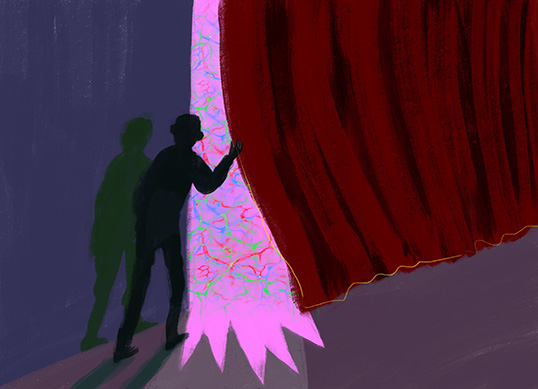The brand new Spring 2018 issue of Asymptote Journal is almost one week old and we are still enjoying this diverse set of writing. Today, our section editors share highlights from their respective sections.
The phrase “Once upon an animal” has been circulating in me for months, ever since I first read Brent Armendinger’s translations of the Argentine poet Néstor Perlongher. The familiar fairy tale opening, ”Once upon a . . .” asks one to think of a moment, distant, in time, when such and such happened—happened miraculously or cruelly and from which one might take (dis)comfort or knowledge of some, perhaps universal, human frailty or courage. But Perlongher/Armendinger replace “time” with “animal”—a body. Against time, in its very absence, we’re asked to look at this body, which is in anguish, now. Perhaps now too is in anguish.
I can’t read Spanish, but the translation suggests a poetry of complex syntactical structures and lexical shock:
Once upon an animal fugitive and fossil, but its felonies
betrayed the same sense of petals
in whose gums it stank, tangled, the anguish
impaled, like a young invader
A feat of translation, no doubt. Armendinger writes that “this intensely embodied and unapologetically queer language” is what drew him to Perlongher, and now we too are drawn in.
Perlongher was a founder of the Frente de Liberación Homosexual Argentino, agitated against the military dictatorship, and, as an anthropologist, wrote about sex workers, and gay and transgender subcultures. All this—writing, work, and play—was perhaps yet another way of saying: “Be still, death:”; “in the steam of that / eruption: ruptured play, rose / the lamé.”
—Aditi Machado, Poetry Editor
While the work of Cairo-based writer and artist Amira Hanafi is wide-ranging—stories, drawings, dictionaries, diagrams, installations—a common denominator is multi-vocal storytelling. In an interview, Hanafi discusses her interest “in the complexity of meaning that comes from collaging different voices, in the intersections of identities that are expressed, and in how multivocality can be an expression of collectivity, its rewards and challenges.” For example, the recent project A Dictionary of the Revolution included a “vocabulary box” with 160 words in Egyptian colloquial Arabic that circulated in public discourse immediately following the 2011 revolution. The box was used as a starting point for conversations with over two hundred people across Egypt, but then the transcriptions were reworked as imaginary dialogues. “I tried to sculpt texts that document language as a living, breathing thing located in people’s mouths,” explains Hanafi. “But the mouths here are disconnected from bodies, so that the relationship of the reader to the language can’t contain judgment based on a person’s physical characteristics or how they speak.” In this interview, Hanafi discusses language as material, her loyalty to the research and archival process, as well as the importance of cities—especially Chicago and Cairo—to her practice.
—Eva Heisler, Visual Editor
This drama section features except from Alain Foix’s The Last Scene translated from the French by Amelia Parenteau and Shu Matsui’s Proud Son translated from the Japanese by Kyoko Yoshida and Andy Bragen. The Last Scene is a harrowing, caustic tale of rage and disempowerment and racism eloquently rendered by Parenteau. Proud Son is a sly comic family drama with dark undertones wittily translated by Oshida and Bragen.
—Caridad Svich, Drama Editor
The contemporary cultural mainstream, Mario Vargas Llosa writes in Notes on the Death of Culture: Essays on Spectacle and Society (Picador, 2015), “privileges wit over intelligence, images over ideas, humor over gravity, banality over depth, and frivolity over seriousness.” Once the primary medium for interrogating the public conscience and confronting the Big Questions, culture has now become the primary means of escaping them, Vargas Llosa argues.
By the death of capital C culture, what he really means to say is that bookish culture is in crisis: the relevance of the public intellectual is fading, literary culture has never been more marginal, and the dominant culture rewards cheap, navel-gazing thrills over rigorous ideas.
I spoke to Vargas Llosa in February about cultural cynicism, the image/idea and art/entertainment binaries drawn in Notes, and the place of younger writers in a culture that he considers increasingly hostile to serious writing.
—Henry Ace Knight, Interviews Editor
My highlight this month is Contributing Editor Dylan Suher’s review of Little Reunions by Eileen Chang, translated from the Chinese by Jane Weizhen Pan and Martin Merz. Suher gives a frank appraisal of this messy, unperfected novel, which was published posthumously and appears for the first time in English this year, published by New York Review Books. It comprises a thinly fictionalised portrait of Chang’s early relationship with the much older Hu Lancheng, a relationship to which Chang was to return time and again in her fiction writing, and which was a source of fascination for many of her readers. Suher reads Little Reunions with a discerning eye, in the light of Chang’s other writing. Using a famous photograph as an analogy for the control she exercised over her own self-presentation, he argues that, in this novel as elsewhere, “Chang rules over the worlds she creates like an Old Testament God.”
—Ellen Jones, Criticism Editor
In the Spring 2018 issue, Fabrizio Coscia’s essay, “All I ask is to finish my work,” brings literature alive. Unlike academic criticism that too often makes the writer dissolve before the work, in his essay, Fabrizio is there, as a young man, remembering the TV announcing news of Pasolini’s death. The essay begins by tracing the place Pasolini had in Coscia’s life, and the way his death resonated through Italian society, but, in a sort of comparative tryptych, then moves on to the writer’s deeply personal relationships with the work of Isaac Babel and Federico García Lorca. In each of these mini-studies the visceral reality and presence of their words is palpable. Here are words that matter for life.
—Joshua Craze, Nonfiction Editor
*****
Like what you read here? Don’t miss our Spring 2018 Korean literature feature! Here’s a sampling:

